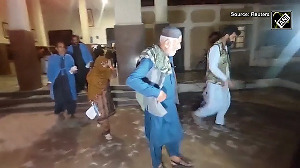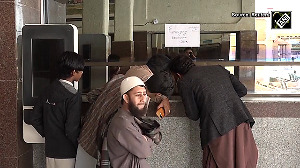It was going to be the first such tour of its kind in India; in America, the Policy Unity Tour, started in 1997, rides every May from the World Trade Center to Washington, DC, to honour fallen officers. It also raises money from the public and fellow officers for starting a police museum in DC.
"The heightened terror alert in India was covering many cities we were going to be in," he continued. "We were to land in Mumbai, and then go to Ahmedabad, and return from New Delhi." The American officers were to end their tour, backed by a Gujarati association, prominent East Coast Gujaratis and the Gujarat government, on January 14.
For several days last week, Phillips and fellow officers agonised over going to India. In the final reckoning, they felt the risk could not be taken.
"We weighed several factors," he said. "We also realised we did not want to put pressure any extra pressure on Indian police officers to protect us."
"Even if one of our officers had been injured, it would have caused a big concern here," he added. "We ride for those who died. We were not going to take the risk of being hurt. It would have affected our own Police Unity Tour. Our leadership would have been questioned. Officers would have asked us what kind of leaders we were to endanger the lives of American police officers when there was a terror alert."
"And then, it was not the question of dealing with just one department," Phillips, who had been to India several months ago to prepare for the tour, continued. "We had officers coming from all over the country from many departments."
The solidarity tour, in the works for over six months, came out of friendship between the Police Unity Tour with several Indian community leaders including Dr Vithal Dhadhuk and businessman Albert Jasani. For over a decade Royal Albert's Palace, the hotel and banquet complex owned by Jasani, has been hosting over 100 police officers for a day on their way to DC each year.
Police Unity Tour had planned a weeklong ride in the Sardar Patel World Unity Tour -- a 100-mile ride.
Phillips and other officers had admired a huge statue of Sardar Vallabhbhai Patel outside Albert's Palace. "We were told he is the unifier of modern India, the George Washington of India," he said.
"We were going to India to express our support to police officers who risk their lives to safeguard citizens," he continued. "It was also our way of appreciating the help we have received from the Indian community here."
The solidarity tour was part of the commemoration of 50 years of Gujarat statehood. The officers were also to go to various places associated with not only Patel but also Mahatma Gandhi in Gujarat. The programme had the enthusiastic backing of Gujarat Chief Minister Narendra Modi.
Dr Dhadhuk, who was not available for comment for this article, had said at a press conference in New York in December that Modi had offered the tour the fullest help and wanted it to succeed spectacularly.
"We are completely apolitical," Phillips said. "We do things differently here. We don't look for help from the government. We just cycle (to DC) and if we meet (New Jersey Governor) Christie, for example, we will greet him."
He also wondered if the trip could have taken place if it had not been announced with a lot of publicity.
"In hindsight, perhaps the tour could have held first and then publicity given to it when it ended ," he said, hastening to add that the Indian associations and community leaders were extremely sincere and thoughtful in planning it. "They wanted this to succeed as much as we wanted. They had hoped that there would be similar tours in other parts of the country."
Dhadhuk had also said awareness had to be created in Indian states that despite the help given by the government to the widows of fallen officers, there was much more to be done. The public could supplement government efforts to help the widows and their children, he had added.
Phillips had heard that the police officers in Gujarat had started the tour. "To that extent, a big part of the mission has been accomplished," he continued.
"May be the next time we think of something like this," he said, "We could plan to take a smaller group of officers from here. And we might think of doing it around the time when there is no big holiday or a public event taking place in the country."







 © 2025
© 2025